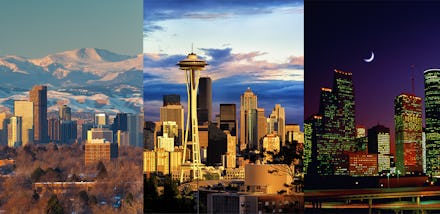The U.S. Cities Gaining Young College Grads Fastest Aren't New York or Los Angeles

Why are cities so eager to attract yuppies?
The theory goes, the Washington Post's Jeff Guo explains, that when highly educated workers cluster together, they tend to raise each others' productivity and create pockets of extremely productive and well-educated professionals. Because college-educated workers are so productive, cities have a major incentive to attract them. (This theory is actually backed by data from Harvard's Edward Glaeser and Matthew Resseger, who wrote a 2009 study concluding that "human capital accumulates more quickly in urban areas.")
But what cities are doing the best job attracting smart, young grads? To get a clearer picture, Guo mapped both the absolute increases and the rate of growth of college graduates in various metropolitan statistical areas from 2007 to 2012. Some cities stand out in the race for college students, while others are falling way, way behind.
According to the data, America's new most competitive cities for college grads are Denver, Seattle and Houston, all of which have seen roughly 20% growth in the number of adults with four-year degrees over the 2007-2012 period. Other powerhouses include Dallas, San Francisco, Minneapolis, San Diego and Pittsburgh, all of which saw increases of at least 15%. New York and L.A. came in at 10.4% and 11.2% respectively, while Atlanta, Boston and St. Louis are all stagnating. Detroit came in at a miserable 3.5%.
But the percentage-based increases look a lot different than the absolute numbers, where New York and L.A. still dominate, followed closely by large and conventionally attractive cities like Chicago and Philadelphia.
What's does this mean for me? High levels of growth among the college-educated typically indicate high levels of economic opportunity, but may also indicate that it's not just cities and companies competing to attract those workers. They may also be competing among themselves for the best jobs.
Cities experiencing robust growth in the number of college graduates may have other drawbacks. For example, the American metro areas with the most expensive housing prices includes San Francisco, New York, Los Angeles, Seattle and D.C., but also areas with very "meh" growth, like Boston. Seattle, Pittsburgh, Houston and Denver all rank among the top 25 U.S. cities for youth unemployment and debt, proving that just cramming enough college grads in a city doesn't necessarily make it a safe economic bet for new diploma-holders.
Nevertheless, these "drawbacks" are arguably a part of any city's growth and would theoretically be addressed by the increase in productivity from the collection of human capital. Hopefully that, or something like it, holds true; these cities' growth shows no signs of slowing down.